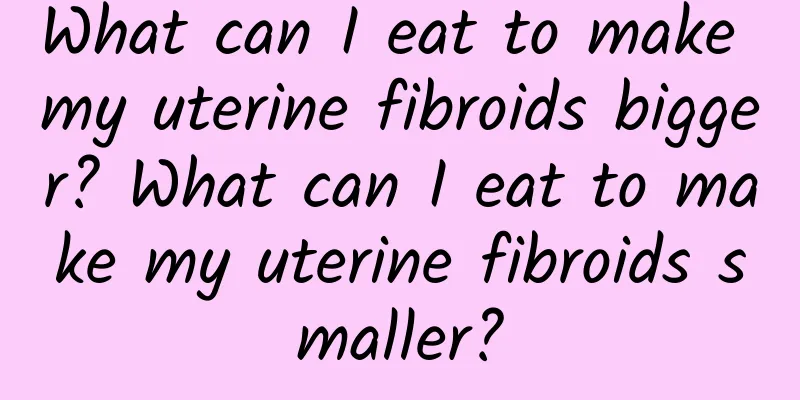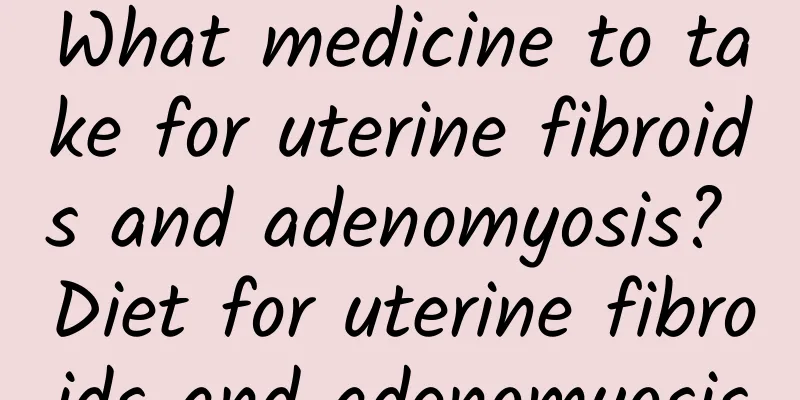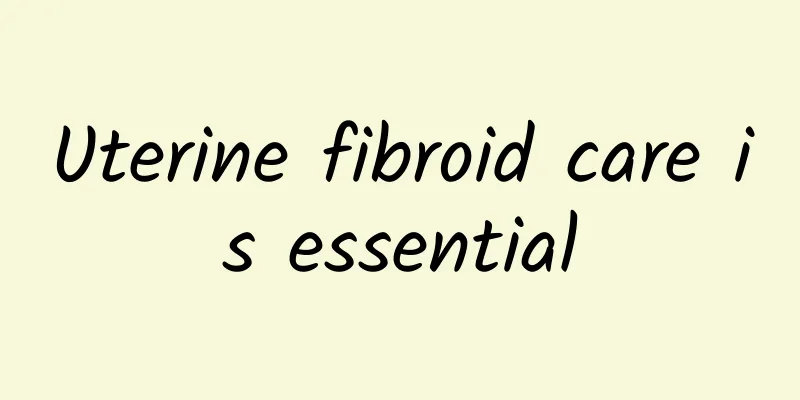What can I eat to make my uterine fibroids bigger? What can I eat to make my uterine fibroids smaller?

|
Uterine fibroids, also known as uterine fibroids, are common benign tumors in gynecology, mostly occurring in women of childbearing age. Uterine fibroids can cause certain troubles for women in life, so many people hope to relieve symptoms through dietary conditioning. However, incorrect eating habits may promote the growth of uterine fibroids, while correct eating habits can play a certain role in reducing fibroids. So, how can we properly regulate our diet? This article will introduce you in detail from three aspects. 1. Effects of a high-fat diet A high-fat diet refers to foods that contain excessive amounts of fat and cholesterol, such as pork and beef. These foods can cause endocrine disorders, causing the endometrium to continue to proliferate, and thus causing the growth of uterine fibroids. Therefore, patients with uterine fibroids should avoid consuming too much high-fat food and try to choose low-fat foods such as fish, chicken, and tofu instead. 2. Fiber-Rich Foods Fiber is an important nutrient that plays a positive role in reducing uterine fibroids. Fiber-rich foods help promote intestinal peristalsis, excrete waste and excess estrogen from the body, and reduce the growth of uterine fibroids. Vegetables, fruits, and whole grains are all good sources of fiber, so patients with uterine fibroids can eat more of these foods and appropriately increase their dietary fiber intake. 3. The problem with high-estrogen foods The growth of uterine fibroids is closely related to the estrogen level in the body. Excessive intake of high-estrogen foods will lead to increased estrogen levels in the body, which in turn stimulates the growth of fibroids. High-estrogen foods include milk, meat, soy products, etc., so patients with uterine fibroids should avoid excessive intake of these foods. On the contrary, some low-estrogen foods, such as bean sprouts, green tea, kelp, etc., can help inhibit the growth of fibroids, so they can be consumed in moderation. There is a close connection between progesterone and uterine fibroids, so some factors in the diet can affect the secretion of progesterone, thereby affecting the growth of uterine fibroids. Although the therapeutic effect of diet on uterine fibroids is limited, reasonable dietary conditioning can effectively reduce the size of fibroids and relieve symptoms. Therefore, as patients with uterine fibroids, we should try to avoid high-fat diets, consume more fiber-rich foods, and limit the intake of high-estrogen foods. Of course, in the process of dietary conditioning, we should also pay attention to the differences in personal constitutions and consult doctors or nutritionists for advice. |
>>: What effect does Panax notoginseng have on uterine fibroids?
Recommend
Experts briefly analyze the common symptoms of uterine fibroids
Some of the symptoms of uterine fibroids are rela...
What surgery can cure threatened abortion?
Pregnancy makes the whole family happy and joyful...
What tests should be performed for congenital absence of vagina
Congenital absence of vagina can be checked by it...
Why does menstruation take time to come after curettage?
Why does menstruation take time to come after cur...
Can bacterial vaginosis be completely cured?
Among the various types of vaginitis, everyone mu...
10 tips! Summer easy slim belly
As summer approaches, many people start wearing c...
What are the symptoms of ovarian cysts?
What are the symptoms of ovarian cysts? Ovarian c...
Magnesium deficiency may cause fatigue, headaches, and memory loss! Nutritionist Li Wanping: 5 must-eat foods rich in magnesium
Do you often feel inexplicably tired, dizzy, have...
What are the symptoms of pelvic inflammatory disease?
Symptoms of pelvic inflammatory disease generally...
Is irregular menstruation hereditary?
Can irregular menstruation be inherited? Patients...
Is it absolutely not advisable to train abdominal muscles during pregnancy? Before pregnant mothers exercise, understand these things first
Many pregnant women seem to think that the baby g...
What are the clinical symptoms of congenital absence of vagina?
You should know that the symptom of congenital ab...
Is high protein, low carbohydrate, and low calorie a good way to lose weight? Nutritionist: Fear of muscle tissue loss
Well-known Korean actor Seo In Guk played the rol...
Metabolic syndrome increases the risk of cardiovascular disease! Doctors are good at teaching and reversing metabolic syndrome in obese people
Metabolic syndrome is a chronic disease. Patients...
How to regulate irregular menstruation
There are many reasons for irregular menstruation...









